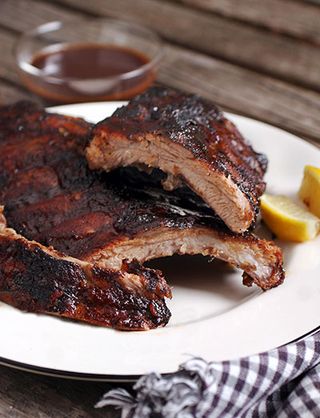To some, May means the Kentucky Derby. To others, the start of the summer growing season. To many backyard chefs, May is the start of barbecue.
Barbecue used to be a very regional thing. One area might mean pork while another means beef. Some barbecue chefs prefer to smoke, some to grill, and some to braise. There are passionate arguments about dry (a spice rub) vs. wet (cooking with the sauce), and even the ingredients in a sauce, whether the meat is cooked in it or not.
I like to barbecue, and I don’t like to get drawn in to one technique over another. No matter the method, barbecue is just good food. I’ve made a tasty POM pomegranate juice barbecue sauce for pork baby back ribs. The sweet spice of the sauce is a nice balance to the salty, tender rib meat.
 POM Pomegranate Barbecue Ribs:
POM Pomegranate Barbecue Ribs:
Sauce (enough for a couple racks, will refrigerate for two weeks):
1 cup POM 100% pomegranate juice
3 oz tomato paste (half a small can)
1½ tablespoons molasses
1/2 tablespoon dry mustard
1/2 tablespoon cumin powder
2 cloves garlic, minced
2 tablespoons honey
1/2 cherry or jalapeno pepper, minced (optional — for heat)
1 lemon, juiced
Salt and pepper to taste
Ribs
1 rack pork baby back ribs
1/2 tablespoon kosher salt (or 1 teaspoon table salt)
1/2 tablespoon paprika
1/2 tablespoon onion powder
1/2 tablespoon garlic powder
1 teaspoon black pepper, ground coarsely
I’m making a pomegranate juice sauce with tomato paste, molasses, honey, mustard, and spices. Barbecue sauce is a very personal thing, as a trip to the supermarket can reveal. The ratios of these ingredients can be nudged one way or another based on personal taste.
I start out by mincing a couple medium cloves of garlic, and about half a pickled cherry pepper (which is optional — I like a little heat in my barbecue).
I add 1 cup POM 100% pomegranate juice to a large saucepan, then add the garlic and cherry pepper, half a small can of tomato paste, and 1.5 tablespoons of molasses.
For the spices, I add half a tablespoon of mustard powder, half a tablespoon of cumin powder, then finally 2 tablespoons of honey.
All of this is whisked together and simmered until it cooks and thickens. It will reduce by about a third to a half.
I actually duck out of the wet vs. dry debate, because I like to do both. Dry on the grill, then later, wet in the oven. Personally, I think it’s the best of both worlds — a nice browned grilled flavor on the meat, followed by an almost-braise while slow cooking in the sauce.
My dry rub is pretty simple: equal parts kosher salt, onion powder, garlic powder, paprika, and about half as much black pepper, mixed together and liberally patted on each side of the ribs.
I grill each side of the ribs on a hot grill until some good browning occurs. This is purely for taste; it won’t cook the ribs very much and the whole “sealing in the juices” thing is a myth. The heat will brown the meat and spices and give everything a nice character. If you don’t want to use a grill, you can use your oven broiler and get a similar effect.
I grill each side of the ribs on a hot grill until some good browning occurs. This is purely for taste; it won’t cook the ribs very much and the whole “sealing in the juices” thing is a myth. The heat will brown the meat and spices and give everything a nice character. If you don’t want to use a grill, you can use your oven broiler and get a similar effect.
Once the rack is browned, I put it on a sheet, cover it with foil, and bake in a preheated 275 degree oven for 30 minutes (if you used the broiler, make sure the oven has cooled to 275 degrees).
Once the sauce has thickened, I take it off the heat and add the juice of a lemon for some brightness.
After the ribs have baked for 30 minutes, I baste liberally with the barbecue sauce and bake for another 30 minutes (an hour, total).
The ribs should be at least 160 degrees for doneness, and the slower it got to that temperature,the more tender the ribs will be.
For a little more taste, I baste one more time, then put the ribs under the broiler for an extra 2-5 minutes, until the sauce bubbles and browns a bit more. This is optional, too — after an hour of making your kitchen smell nice, you might just want to dig in!
Cut the rack in half, and you could separate the ribs with a knife if you want, too. Serve plenty of napkins, and some extra pomegranate barbecue sauce on the side.
- Recipe by Peter Krause for POM

